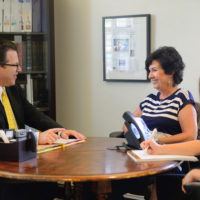Time for Elder Care?
By KRISTEN GERENCHER
Wall Street Journal
Sunday November 4, 2012
Pay close attention to your aging parents on a holiday visit this year. Does the normally tidy house now seem neglected? Is there hoarding? Do you notice memory problems, confusion or physical unsteadiness?
Discovering that a parent’s physical or mental health is declining can be heavy on the heart. It also can be hard on your finances.
“The first thing we tell our clients is don’t panic,” says Byron Cordes, president of the National Association of Professional Geriatric Care Managers, and a geriatric-care manager in San Antonio. “Come up with a plan.”
Feeling overwhelmed may prompt you to spend money on the wrong things, such as full-time care, when your parent just needs delivered meals or someone to run errands a few times a week. Here are some tips:
1. Assess needs
Ask your parent’s physician what his or her physical and mental deficits are—assuming your parent allows you to sit in on appointments or consents to the release of his or her medical records. You can always send written concerns to the doctor, and if you have power of attorney for a parent’s health care, attach a copy of that document, says Linda Fodrini-Johnson, a geriatric care manager in Walnut Creek, Calif.
Also consider hiring a geriatric care manager—a social worker, nurse, psychologist or gerontologist with additional training and certification—for a consultation or an assessment. They know the nuances of elder care and local organizations that can help seniors remain independent, says Ms. Fodrini-Johnson.
A one-time consultation costs about $150. An assessment typically runs $500 to $700, Mr. Cordes says. You can find a geriatric care manager near you at caremanager.org.
2. Take stock of benefits.
Visit BenefitsCheckUp.org, a site run by the National Council on Aging, to find out what benefits, discounts and programs your parent may be eligible for.
A search for a Medicare beneficiary who owns her Arizona home and has three chronic medical conditions turned up 11 programs, including a discount drug program, free legal assistance and caregiver respite.
Your local Area Agency on Aging (www.n4a.org) offers information on in-home support, transportation, adult day care, skilled nursing facilities and senior nutrition programs.
Is your parent a veteran or the widow or spouse of one? Eldercare.gov, a government-sponsored site (1-800-677-1116), can direct you to your local veterans’ resource center for help applying for benefits, among other services. If your parent is low-income, he or she doesn’t have to be on Social Security’s Supplemental Security Income (SSI) program to be eligible for in-home supportive services, Ms. Fodrini-Johnson says.
And don’t forget your benefits. Some employers offer elder-care referral services or cover need assessments for a parent.
3. Timing is everything
Medicare doesn’t cover most long-term care costs. Medicaid covers them under certain conditions.
If your parent needs Medicaid coverage, timing matters,” says Gregory French, president of the National Academy of Elder Law Attorneys, or NAELA, and an elder-law attorney in Cincinnati.
Eligibility can be harmed if your parent makes cash gifts or transfers assets within five years of applying for Medicaid, he says. In a best-case scenario, families work with an elder-law attorney before the aging parent loses the ability to make decisions, Mr. French says. Find a NAELA member at naela.org.
4. Factor in hospice care
If you’re looking into an assisted-living facility or residential care home, which typically offers individualized care to a small group in a home setting, find out if it works with hospice—if or when the need arises. Not all places are equipped to do so, Ms. Fodrini-Johnson says.











